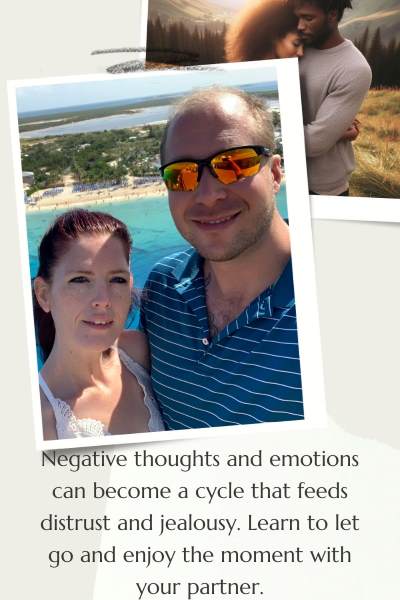Getting over past trauma and building real trust doesn’t have to be hard
The only way to work through jealousy and trust issues in a relationship is to figure out the root cause, learn to respect your partner with forgiveness and autonomy.
Jealousy and trust issues are common problems that can affect any relationship. When we are romantically involved with someone, those feelings can hit us with a power that is exponentially more.
Jealousy is the fear of losing something or someone you value to a perceived rival, while trust issues are the lack of confidence in someone’s honesty, reliability, or intentions. Both jealousy and trust issues can stem from various factors, such as past experiences, personal insecurities, unrealistic expectations, or poor communication.
And I think jealousy and trust are 2 things that every relationship is going to have to face and overcome in order to grow into something amazing that lasts a lifetime.
If you are struggling with jealousy and trust issues in your relationship, you may feel angry, anxious, suspicious, or resentful. You may also engage in behaviors that are damaging to your relationship, such as spying, accusing, controlling, or isolating.
In our romantic relationships, these behaviors can create a vicious cycle of mistrust, conflict, and dissatisfaction, which can eventually lead to the end of your relationship if left unresolved.
Fortunately, there are ways to overcome jealousy and trust issues and build a healthy, happy, and lasting relationship. Below I’ve built out the top 11 tips that can help you cope with these negative emotions and improve your relationship quality.
1. Identify the root causes of your jealousy and trust issues
You will never be able to get over any jealousy or trust issues if you don’t first understand where they are coming from. What are the triggers that make you feel jealous or insecure?
What are the beliefs or assumptions that fuel your fears? What are the experiences or influences that shaped your views on trust and relationships?
There are going to be a variety of different factors but as a man, I can tell you the vast majority revolve around the idea of another man intruding. And this can be totally frivolous and nothing to fear or it can be driven by very real past experience.
Research shows just how much this is true. Studies have also shown that men worry and become jealous of the potential for physical infidelity while women tend to become more jealous of the potential for emotional infidelity.
Either way it needs to be addressed in your current relationship if you ever want it to grow into something more.
Some common causes of jealousy and trust issues include:
- Having a history of being betrayed, cheated on, or abandoned by someone you loved
- Having low self-esteem, self-worth, or self-confidence
- Having unrealistic or unmet expectations of yourself or your partner
- Having different values, goals, or preferences than your partner
- Having poor communication or conflict resolution skills
- Having a lack of social support or hobbies outside of your relationship
- Having a personality disorder, such as borderline, narcissistic, or paranoid
To identify the root causes of your jealousy and trust issues, you can try to:
- Reflect on your past and present relationships and how they affected your feelings and behaviors
- Write down your thoughts and feelings in a journal or a letter to yourself
- Talk to a trusted friend, family member, or therapist who can offer you support and insight
- Take a personality test or a quiz to assess your level of jealousy or trust issues
Identifying the root causes of your jealousy are the very first step in working through them and building a relationship of mutual trust.

2. Challenge your negative thoughts and emotions
The second step to overcoming jealousy and trust issues is to challenge your negative thoughts and emotions.
Often, jealousy and trust issues are based on irrational or distorted thinking that does not reflect reality. For example, you may think that your partner is lying to you, flirting with someone else, or planning to leave you, even when there is no evidence to support these claims.
These thoughts can make you feel angry, anxious, or depressed, which can then lead you to act in ways that are harmful to your relationship.
Intrusive thoughts happen even if they are totally unfounded. That’s just how our brains work but they don’t have to drive us to some sort of breaking point.
Instead we have to recognize them and learn to see what those thoughts are really stemming from. And a big part of this is trying to practice having empathy towards your partner.
To challenge your negative thoughts and emotions, you can try to:
- Use cognitive-behavioral techniques, such as identifying and replacing your cognitive distortions, such as mind-reading, jumping to conclusions, or catastrophizing
- Use mindfulness techniques, such as observing and accepting your thoughts and emotions without judging or reacting to them
- Use positive affirmations, such as repeating statements that boost your self-esteem, self-worth, or self-confidence
- Use coping skills, such as breathing exercises, meditation, or relaxation techniques, to calm yourself down when you feel jealous or insecure
3. Communicate openly and honestly with your partner
The third step to overcoming jealousy and trust issues is to communicate openly and honestly with your partner.
If you’ve ever read one of my articles, you know how important communication is to a healthy and successful relationship. Communication is the key to any relationship, as it allows you to express your needs, wants, feelings, and concerns, as well as to listen to and understand your partner’s perspective.
Communication can also help you to resolve conflicts, clear misunderstandings, and build trust and intimacy.
And with proper communication you can realize that jealousy in your relationship isn’t all bad and can actually stem from a good place, a place of having a high level of value towards your partner.
To communicate openly and honestly with your partner, you can try to:
- Use “I” statements, such as “I feel jealous when you talk to your ex” or “I need more reassurance from you”, instead of “You” statements, such as “You are always talking to your ex” or “You don’t care about me”, which can sound accusatory or blaming
- Use active listening skills, such as nodding, paraphrasing, or asking questions, to show your interest and attention to what your partner is saying
- Use assertive communication skills, such as stating your opinions, preferences, or boundaries, without being aggressive or passive
- Use nonverbal communication skills, such as eye contact, facial expressions, or body language, to convey your emotions and intentions
- Use constructive feedback skills, such as giving praise, appreciation, or suggestions, instead of criticism, complaints, or insults
4. Build trust and mutual respect in your relationship
One of the biggest key steps in overcoming jealousy and trust issues is to build trust and mutual respect in your relationship. Trust and respect are the foundation of any healthy relationship, as they allow you to feel safe, secure, and valued by your partner.
Trust and respect also enable you to give and receive support, encouragement, and affection from your partner.
To build trust and mutual respect in your relationship, you can try to:
- Be honest and loyal to your partner, and expect the same from them
- Be accountable and responsible for your actions, and apologize when you make a mistake
- Give your partner the benefit of the doubt, and avoid jumping to conclusions or making assumptions
- Express your feelings and needs to your partner, and respect their feelings and needs as well
- Don’t do anything that you wouldn’t want your partner to do, such as lying, cheating, or hiding things from them

5. Focus on the positive aspects of your relationship
One of the best ways to build up the trust in your relationship is to focus on the positive aspects of it.
Sometimes, jealousy and trust issues can make you overlook or forget the good things that your partner does for you or the relationship.
It can blind us emotionally so we may focus on the flaws, faults, or mistakes of your partner, and ignore their strengths, virtues, or achievements. This is the start of a resentment cycle which can feed itself if you don’t consciously act to stop it.
To focus on the positive aspects of your relationship, you can try to:
- Express your appreciation and gratitude to your partner for the things they do for you or the relationship, such as giving you a compliment, a gift, or a hug
- Celebrate your partner’s successes and achievements, such as getting a promotion, a raise, or a recognition, and congratulate them for their efforts
- Reminisce about the happy memories and experiences that you shared with your partner, such as your first date, your first kiss, or your first trip together
- Plan fun and romantic activities that you can do with your partner, such as going to a movie, a restaurant, or a park, or staying at home and cuddling on the couch
- Create a list of the reasons why you love your partner, and read it whenever you feel jealous or insecure
6. Avoid comparing yourself or your relationship to others
When you’re in a relationship, you need to avoid comparing yourself or your relationship to others. Think of the other relationships you know of. Chances are you only truly know about the highlights of it. The things that get posted on social media or talked about.
Comparing yourself or your relationship to others can make you feel inadequate, inferior, or dissatisfied with your partner.
When we feel like others have the kind of relationship we only dream of, that feeds the very foundations of jealousy which builds our resentment towards our partner for not giving us the relationship we think these other people have.
To avoid comparing yourself or your relationship to others, you can try to:
- Recognize that everyone is different, and that no one is perfect
- Appreciate your own strengths, talents, and achievements, and those of your partner
- Accept your own weaknesses, flaws, and challenges, and those of your partner
- Realize that what you see on social media, TV, or movies is not always the reality
- Remind yourself that you are unique, and that your relationship is special
7. Work on your personal growth and development
Sometimes, jealousy and trust issues can stem from your own insecurities, fears, or unfulfilled needs.
You may feel that you are not good enough, worthy enough, or lovable enough for your partner, and that they will eventually leave you for someone else. This can make you feel or worse, act dependent, needy, or clingy in your relationship.
I think we have all had experiences with people in our lives that just weren’t on a path of growth like we were. Sometimes people stagnate and sometimes it’s for good reason.
But when we seek out growing as an individual and a person we are on the path to becoming a better lover, better boyfriend or girlfriend, and better future spouse.
The foundation of a healthy and successful relationship is trust, respect, and love. Notice trust comes first, because you can’t respect someone you can’t trust, and can’t fall in love with someone you can’t respect or trust.
To work on your personal growth and development, you can try to:
- Set and pursue your own goals, dreams, and passions, and celebrate your progress and achievements
- Learn new skills, hobbies, or interests, and expand your knowledge and horizons
- Take care of your physical, mental, and emotional health, and practice self-care and self-compassion
- Seek professional help if you have any mental health issues, such as depression, anxiety, or trauma, that may be affecting your self-esteem or relationship
- Join a support group, a club, or a community that shares your values, interests, or beliefs, and make new friends and connections

8. Respect your partner’s privacy and autonomy
You must learn to respect your partner’s privacy, boundaries and autonomy if you ever want a relationship with a healthy foundation of trust.
Privacy and autonomy are essential for any healthy relationship, as they allow you to maintain your individuality, identity, and dignity. Privacy and autonomy also foster trust, respect, and intimacy in your relationship.
My wife and I are totally open with each other’s phones. I can ask at any time and look through hers and she can mine. But if she came in the house to me simply going through her phone behind her back, what would that say to her?
When we distrust our partner it tells them 2 things. First, it says we can’t trust them and thus don’t really respect them or believe that they respect or care for us how they say they do.
And secondly, it shows them that we have trust issues which makes us untrustworthy. Think about it for a moment, if she can’t trust you to respect her phone, can she trust you to respect your relationship?
To respect your partner’s privacy and autonomy, you can try to:
- Trust your partner and give them the benefit of the doubt, and avoid spying, snooping, or checking on them
- Allow your partner to have their own friends, hobbies, or interests, and support their choices and preferences
- Encourage your partner to pursue their own goals, dreams, and passions, and celebrate their progress and achievements
- Respect your partner’s boundaries and limits, and don’t pressure, coerce, or manipulate them to do something they don’t want to do
- Ask your partner for permission before accessing their personal information, such as their phone, email, or social media accounts
9. Seek professional help if needed
Sometimes, jealousy and trust issues can be so severe or chronic that they interfere with your daily functioning, well-being, or relationship. You may feel overwhelmed, helpless, or hopeless, and unable to cope with your negative emotions and behaviors.
In times like this we need to turn towards professionals who can look at us and our situation objectively and give us insight that we may not be able to see on our own.
Relationship counselors or therapists are trained in ways to get us to see past our own defenses and begin making the hard changes that are needed to get us on the road to being able to have a happy and healthy relationship built on real trust.
If you feel that you need professional help, you can try to:
- Find a qualified therapist, counselor, or coach who specializes in jealousy, trust, or relationship issues, and who can offer you individual, couples, or group therapy
- Ask your doctor for a referral to a psychiatrist, psychologist, or other mental health professional who can prescribe you medication, if necessary, or recommend you other forms of treatment, such as cognitive-behavioral therapy, dialectical behavior therapy, or eye movement desensitization and reprocessing
- Seek online or phone counseling, coaching, or support, if you prefer a more convenient, accessible, or affordable option, or if you are unable to find a suitable professional in your area
- Join a support group, a forum, or a community that deals with jealousy, trust, or relationship issues, and where you can share your experiences, feelings, and challenges with others who understand and empathize with you
10. Be patient and persistent with yourself and your partner
Relationships take patience.
Let’s be honest, you’re going to be with your partner for so much time that you will learn every nasty habit, every gross bodily noise, every dirty thing they do. And that can get to be alot at times.
But we have to realize that our partner is only human and so are we. We all have stupid things we do at times. We all say and do things we don’t mean at times. We all will have bad days and tough times.
But part of building a relationship is accepting the good, bad and ugly in a person and realizing that we too have those kinds of things in us as well.
Patience is a way of showing grace to our partner. A way of showing them that our care for them goes further that whatever small infraction they may have made.
To be patient and persistent with yourself and your partner, you can try to:
- Remind yourself of your reasons and motivations for overcoming jealousy and trust issues, and how they will benefit you and your relationship
- Recognize and celebrate your small wins and achievements, and reward yourself for your progress and efforts
- Learn from your mistakes and failures, and use them as opportunities to improve and grow
- Seek and accept feedback and advice from your partner, your therapist, or your support network, and use them to enhance your skills and strategies
- Be flexible and adaptable, and adjust your plans and actions according to the changing circumstances and needs of yourself and your partner
11. Practice forgiveness and compassion
Forgiveness and compassion are the abilities to let go of resentment, anger, or bitterness, and to show kindness, understanding, or empathy. And when it comes to building trust in a relationship compassion and forgiveness can do more than just about anything else.
We are all going to do things that hurt our partner at some point in our relationships.
Whether it’s something as simple as a miscommunication that led to hurt feelings or as serious as getting caught in a lie, forgiveness and compassion are essential for any healthy relationship, as they allow you to heal from the past and move on from the present.
Forgiveness and compassion are 2 of what I have termed, the 7 pillars of trust and also foster mutual trust, respect, and intimacy in your relationship.
To practice forgiveness and compassion, you can try to:
- Forgive yourself and your partner for any mistakes, hurts, or wrongs that you or they have done, and don’t hold grudges or seek revenge
- Understand yourself and your partner’s feelings, thoughts, and actions, and don’t judge or blame them
- Empathize with yourself and your partner’s pain, suffering, or struggles, and don’t minimize or ignore them
- Apologize to yourself and your partner for any harm, damage, or offense that you or they have caused, and don’t make excuses or deny them
- Reconcile with yourself and your partner, and restore your relationship to a state of harmony, peace, and love
Put your trust in your partner and build a relationship that lasts
It can be tough to get over trust issues that we may have from past relationships or traumas, but building a trusting and compassionate relationship is something we can all have.
You can build the trust in your relationship by showing your partner forgiveness, compassion and kindness.
And you can become a trusting and trustworthy partner by working on your personal growth and looking honestly at how those past traumas influence your relationship now.
Sign up for our free newsletter and get the latest articles, research, and great deals to keep your relationship growing.
You can find our latest articles below:
-

How the Presidential Election is Affecting Relationships
The election is just ramping up and with events like the attempted assassination, this election is affecting relationships like never before.
-

What to Do When Your Partner is Gaslighting in the Relationship
Gaslighting can make your relationship fall apart and bring your mental health with it. Here’s how to stop it before it starts.
-

How Men Gaslight Women in a Relationship
Gaslighting is something that can turn a good relationship into a living nightmare. Here’s how to recognize when it happens and what to do.
-

How Women Gaslight Men in a Relationship
Men, you need to be able to recognize when you are being gaslit by your woman. Here’s how and what to do about it to keep you safe and legal.
-

What is Gaslighting in a Relationship?
Gaslighting can turn a good relationship into a living hell, here’s what it is, and how to deal with it before the problems start.
-

Why Women Need to Start Approaching Men
Ladies you need to start approaching men and it is absolutely the #1 fastest way to catch that high quality man of your dreams.
